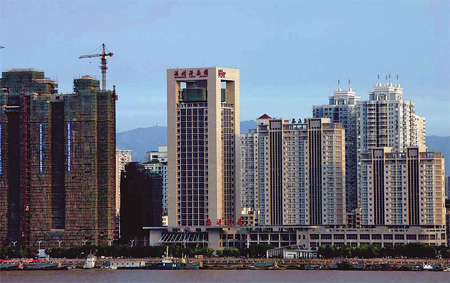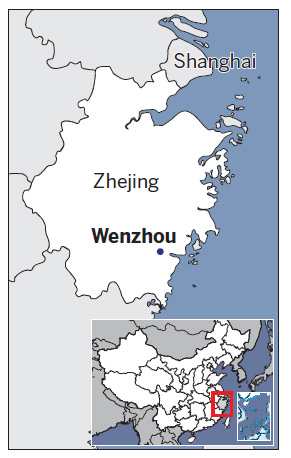The walls come tumbling down
Updated: 2011-09-19 09:26
By Yu Ran (China Daily)
|
|||||||||||
|
Real estate projects under construction in Wenzhou, Zhejiang province. Many local developers have turned to underground financing as China tightens bank lending policies.[Photo / China Daily] |
|
|
SHANGHAI - Months before the central government declared war on the "gray" money market, merchants in Wenzhou had sensed the coming showdown and rushed to dump the properties they'd acquired with loans from underground lenders.
The sell-off has sent property prices in Wenzhou's secondary market tumbling by at least 10 percent since June. If you think that's just a minor blip, picture this: property prices in this Zhejiang province boom town have soared by an average 20 percent in each of the past 3 years. Indeed, most Wenzhou residents can't remember the last time they saw a decline in property prices.
Real estate agents in the city said they have been flooded with sales orders. "My clients are dumping their property holdings not only in Wenzhou, but also in other cities," said Zhao Xiuqin, a sales manager at a local property agency. "It's a stampede, like animals running for their lives from a wild bushfire," she added.
This figurative fire was apparently set by the government. In reaction to growing public discontent about escalating property prices, the authorities introduced various measures to clamp down on excessive speculation. A major thrust of those efforts involved the tightening of bank credit.
China's year-on-year consumer price inflation reached 6.5 percent in July, the fastest pace in 37 months and well above the government's 4 percent target for the year. It eased to 6.2 percent in August, but government officials have hinted that the full-year target may not be met.
The People's Bank of China (PBOC), the central bank, has raised interest rates three times this year, taking the one-year benchmark deposit rate to 3.5 percent and the one-year lending rate to 6.56 percent.
The bank also has increased the reserve-requirement ratio for commercial lenders six times, pushing it to a record 21.5 percent.
In addition, the PBOC has reiterated its commitment to reining in the underground lending market that has been most active in Wenzhou.
"To crack down on illegal underground banking is the current focus of the government to regulate the private financial market and get the risks of private lending under control," said Vice-Premier Wang Qishan at the end of August.
Wang added that it's important to improve the financial market environment with restrictions while ensuring that small and medium-sized enterprises (SMEs) have access to loans to support growth.
His remark caused anxiety in the minds of many Wenzhou merchants who have been funding their speculative exploits, mainly in the property markets in a number of mainland cities and Hong Kong, with loans from the city's underground banks.
A survey by the Wenzhou branch of the PBOC on the best investment method in the second quarter saw property investment knocked off the top spot for the first time since 2009, witnessing a decline of 5.2 percentage points compared with the same period last year.
Even those at the top of the property food chain are feeling the pinch. Tightened bank credit has forced many developers to borrow from the underground lenders - a practice that is quite common among business people in this prosperous eastern city - to cover their short-term funding needs.
"Most of us property developers have to borrow short-term money with high interest rates from underwriting companies or private money lenders for about a week every three months if we have a new project to launch," said one property developer, who was unwilling to be identified.
He added that there was a risk that he might not have enough money to pay back his high-interest loans if the number of buyers continues to decline.
In addition, many SMEs that have been starved of loans as the country tightens credit in its fight against rising inflation, are driving an underground banking boom by turning to unofficial funding sources to survive.















